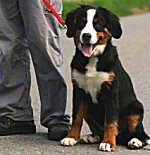Chinese Shar-peis: What's Good About 'Em, What's Bad About 'Em
Chinese Shar-pei temperament, personality, training, behavior, pros and cons, advice, and information, by Michele Welton, Dog Trainer, Behavioral Consultant, Author of 15 Dog Books

This sober and dignified dog with the wrinkled skin, hippopotamus-shaped head, and scowling expression stands firmly on the ground with a calm, confident stature.
The Chinese Shar-pei is quiet and mannerly in the home, naturally clean and easy to housebreak. He makes an impressive companion if you're the kind of owner who can admire his independent character while still enforcing household rules so that he respects you. This can be a challenge, as this breed is dominant and obstinate – definitely not the choice for a first-time dog owner.
Chinese Shar-Pei need only moderate exercise (several brisk daily walks), so they do quite well in the city or suburbs. In fact, unless they are securely fenced, they are not the best choice for a farm or rural setting, for they have strong hunting instincts and may run deer or molest livestock if they get loose.
Aloof with strangers, Chinese Shar-Pei must be accustomed to people at an early age so that their natural territorial instincts are properly discriminatory.
Though he usually minds his own business unless provoked, some Chinese Shar-Pei are aggressive with other dogs, and some individuals are predatory with cats.
See below for warnings about health problems. Unfortunately, health is a major concern when considering this breed.
If you want a dog who...
- Is medium-sized and sturdily-built
- Has a calm, confident nature
- Is naturally clean and easy to housebreak
- Doesn't bark much
- Needs only moderate exercise
- Is very loyal to his family
A Chinese Shar-Pei may be right for you.
If you don't want to deal with...
- Strong-willed mind of his own, requiring a confident owner who can take charge
- Potential aggression toward people when not socialized properly
- Potential aggression toward other animals
- Loud snoring and snorting sounds
- A high price tag
- Serious (often chronic) health problems and expensive vet bills
A Chinese Shar-Pei may not be right for you.
 |
Dog Breed Traits – Which Traits Are Right For You? In this brand new series, I'll help you decide which dog breed traits would best suit you and your family, your home and yard, and your lifestyle, so you can choose the best dog breed for your family. |
Keep in mind that the inheritance of temperament is less predictable than the inheritance of physical traits such as size or shedding. Temperament and behavior are also shaped by raising and training.
FREE eBooks by Michele Welton
![]() "Respect Training for Puppies" and "Teach Your Dog 100 English Words" are free step by step guides to teaching your pup to be calm and well-behaved.
"Respect Training for Puppies" and "Teach Your Dog 100 English Words" are free step by step guides to teaching your pup to be calm and well-behaved.
![]() "11 Things You Must Do Right To Keep Your Dog Healthy and Happy" is a free guide to keeping your dog mentally, physically, and emotionally happy and healthy so you can enjoy a longer lifetime of companionship.
"11 Things You Must Do Right To Keep Your Dog Healthy and Happy" is a free guide to keeping your dog mentally, physically, and emotionally happy and healthy so you can enjoy a longer lifetime of companionship.

- You can avoid some negative traits by choosing an ADULT dog from an animal shelter or rescue group. With an adult dog, you can easily see what you're getting, and plenty of adult Shar-peis have already proven themselves not to have negative characteristics.
- If you want a puppy, you can avoid some negative traits by choosing the right breeder and the right puppy.
More traits and characteristics of the Chinese Shar-Pei
If I was considering a Chinese Shar-pei, I would be most concerned about...
- The strong temperament. Chinese Shar Pei have an independent mind of their own and are not pushovers to raise and train. Many Chinese Sharpeis are willful, obstinate, and dominant (they want to be the boss) and will make you prove that you can make them do things. You must show them, through absolute consistency, that you mean what you say.
To teach your Shar-pei to listen to you, "Respect Training" is mandatory. Read my free online training programs.
- Potential animal aggression. Many Chinese Shar Peis are dominant or aggressive toward other dogs, especially of the same sex. Many have strong instincts to chase and seize cats and other fleeing creatures. This is not a good breed to keep with livestock. If anything goes wrong in the breeding, socializing, training, handling, or management of this breed, it is capable of seriously injuring or killing other animals.
- Chronic health problems. The structure of this breed is quite deformed. Wrinkled folds of skin trap moisture, which leads to itchy skin problems and bacterial infections. Add a bunch of eye diseases and a serious kidney disease and I would recommend that you have ample money set aside for veterinary care. See Chinese Shar Pei Health.
- Shedding and harsh coat. Chinese Shar-pei come in three coat varieties. The horse coat is very short and prickly, and can irritate the skin of sensitive people. The brush coat is thicker, about an inch long. The bear coat is very heavy, like that of a Chow Chow dog. All three coats shed, with the brush and bear coats shedding the most.
- Shar-Pei sounds. Many Chinese Sharpeis snort, grunt, and snore loudly. The sounds are endearing to some people; nerve-wracking to others.
- Potential aggression toward strangers. Some Chinese Shar-Pei are friendly, while others are very reserved. Some have protective instincts toward strangers. But all Shar-Peis need extensive exposure to friendly people so they learn to recognize the normal behaviors of "good guys." Then they can recognize the difference when someone acts abnormally. Without careful socialization, they may be suspicious of everyone.
- Legal liabilities. Chinese Shar Pei may be targeted for "banning" in certain areas, or refusal of homeowner insurance policies. In this day and age, the legal liabilities of owning any breed that looks intimidating and has a history as a fighting dog should be seriously considered. People are quicker to sue if such a dog does anything even remotely questionable.
Frankly, most Chinese Shar Peis are "too much dog" for the average household. And if you have young children, I definitely don't recommend a Shar Pei. There are just too many individuals who won't tolerate any nonsense.
My best-selling books – now available FREE on my website
 Respect Training For Puppies: 30 seconds to a calm, polite, well-behaved puppy is for puppies 2 to 18 months old. Your puppy will learn the 21 skills that all family dogs need to know. Click here to read for free.
Respect Training For Puppies: 30 seconds to a calm, polite, well-behaved puppy is for puppies 2 to 18 months old. Your puppy will learn the 21 skills that all family dogs need to know. Click here to read for free. Teach Your Dog 100 English Words is a unique Vocabulary and Respect Training Program that will teach your adult dog to listen to you and do what you say. Click here to read for free.
Teach Your Dog 100 English Words is a unique Vocabulary and Respect Training Program that will teach your adult dog to listen to you and do what you say. Click here to read for free. 11 Things You Must Do Right To Keep Your Dog Healthy and Happy helps your dog live a longer, healthier life. Get my honest advice about all 11 Things before you bring home your new puppy, because some mistakes with early health care cannot be undone. Click here to read for free.
11 Things You Must Do Right To Keep Your Dog Healthy and Happy helps your dog live a longer, healthier life. Get my honest advice about all 11 Things before you bring home your new puppy, because some mistakes with early health care cannot be undone. Click here to read for free.Related posts you might enjoy






